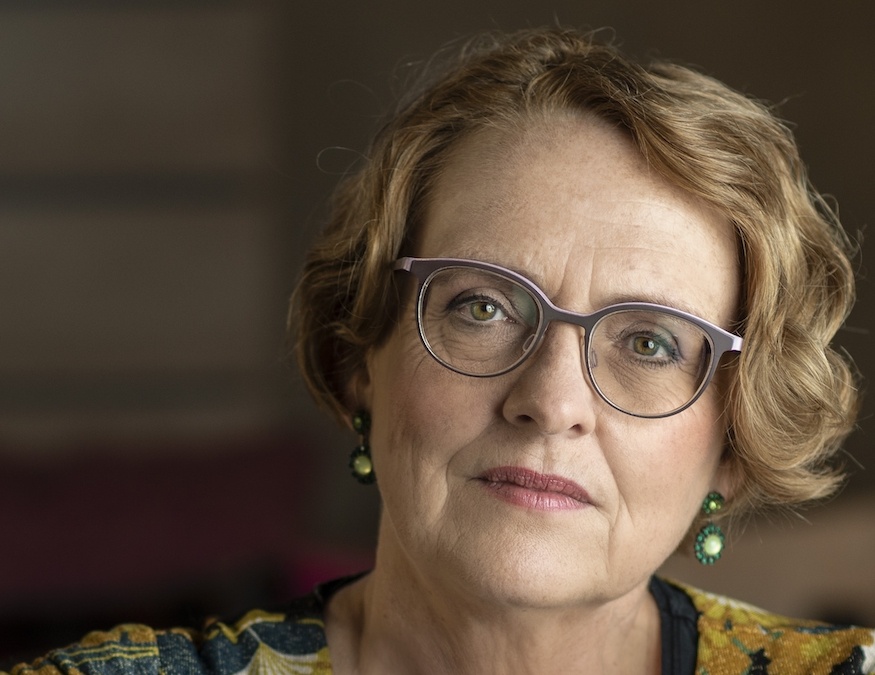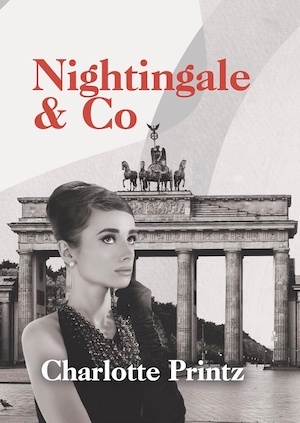
Guten tag, crime fiction lovers – we’ve got a new writer we think you’d be interested to meet. Charlotte Printz is a German cosy crime author whose debut novel, Nightingale & Co, arrives this month in English for the first time from Corylus Books. Set in Berlin, in 1961, it features Carla Koslowsky, who has inherited the Nightingale & Co detective agency from her father. And these are tumultuous times, with Communist East Germany building a wall, almost overnight, around West Berlin.
Before becoming a crime author, Charlotte enjoyed a successful career in television as an editor, scriptwriter and producer. But her love of the genre goes right back to her childhood, when she read crime novels under the covers at night, and worried her teachers by writing her first mystery in primary school. We welcomed her to the Crime Fiction Lover sofa for a little chat about her new book and the ideas behind it.
What are crime fiction lovers going to love about Nightingale & Co?
I hope readers will appreciate the chaotic scenes and sense of humour, as well as the contrast between the two sisters and how they approach a criminal case. Especially when they think they know everything and then something surprising happens.
Who is Carla Koslowsky and how did you come up with her?
Carla resembles Audrey Hepburn and has an almost exaggerated sense of decorum and need for justice. I was inspired to write about her one night in Berlin, when my taxi driver told me that Berlin is a city full of nightingales. Hence the name of the agency.

And who is Wallie and what is her role in the novel?
Wallie provides a contrast to Carla. She arrives and claims to be Carla’s half-sister. She is more of a Marilyn Monroe type physically, and believes that rules were made to be broken. She seems to be more governed by impulse than Carla, but she plays a less straightforward game than one might expect at first sight.
What are they up against?
Both sisters are actually fighting against the patriarchal system of those days in Germany. They have to solve the murder of a man who is a highly-respected public figure, and help a woman who wants to stop being a victim but has few choices open to her.
A woman running a detective agency in 1961 must have been pretty unusual. What did you want to show and explore through this set-up?
It might be hard to believe, but actually 30 per cent of private detectives at that time were women, partly because it was far easier for women in the 1960s to infiltrate private households or businesses without being too conspicuous. I did also slightly draw on a historical figure, Eveline Wippermann, a woman who inherited a detective agency from her father in the 1970s and then later became the President of the Association of Private Investigators.
What I intended to do with the Nightingale series is to remind women how important is to make sure that our hard-earned equal rights are not lost or watered down, and show that there is still room for improvement, even nowadays. Most of the cases that the Nightingale Agency handles stem from the unequal legal status of women in the 1960s.
The period itself is fascinating with the arrival of the Berlin Wall. What interested you about depicting this era in German history? Have memories of it become distorted a little since 1989, with all that’s happened?
Yes, it was an incredibly tense period, which I looked into more closely when I was researching my novel Fräulein Kiss träumt von der Freiheit (Miss Kiss Dreams of Freedom), which sheds light on the events at Radio Free Europe during the Hungarian uprising in 1956. At that time, there was almost a spirit of optimism in the air, but in 1961 the construction of the Wall not only brutally separated families, but also fuelled the Cold War.
We’ve started to see more cosy crime fiction from Germany. What is it about that sub-genre that interests you, and your readers?
I’ve always loved crime novels and thrillers, but I abhor violence and brutal, blood-soaked scenes. Besides, I think that what often hides under the label cosy is in fact an accurate depiction of society. There is often something simmering beneath the surface in families or social groups, so what could be more interesting than exploring those hidden dynamics?
Which crime authors have influenced or inspired you, both German and otherwise?
I have a great appreciation for classic women authors such as Ngaio Marsh, Dorothy Sayers, Margaret Miller, Agatha Christie, Patricia Highsmith and Elizabeth George, although I can’t forget male authors such as Simenon, Rex Stout and Chandler. The contemporary authors I enjoy most are Tana French, with her fabulous storytelling, and Louise Penny, whose Inspector Gamache I would marry on the spot if I were single.
What are you reading at the moment?
I’m currently reading an incredible book, a sort of eerie Magic Mountain from a feminist perspective: Olga Tokarczuk’s The Empusium. As an aside, her earlier novel Drive Your Plow Over the Bones of the Dead could be read as a crime story on one level.
What’s next for Carla and what’s next for Charlotte Printz?
Carla and Wallie are returning in a second book, which was published in Germany recently, and I’m currently working on the third book in the series. The two of them make such an exciting team and the times they live in are so challenging.
Nightingale & Co is published 15 January 2025. Order your copy below, or click here for more German crime fiction.









